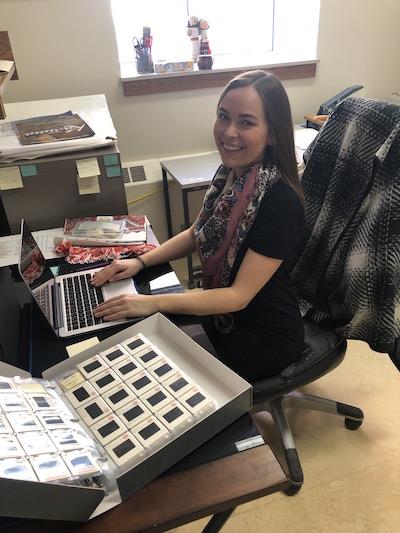
The Kule Folklore Centre received a Young Canada Works in Heritage Organizations grant to hire a Cultural Heritage Intern from September 2019 to February 2020. We were extremely lucky to have Ashley Halko-Addley as our intern. The Kule Folklore Centre is grateful to the Canadian Government and the Canadian Council on Archives for their financial support. We also greatly appreciate the contribution of our Friends Society for their help to make a successful project like this happen.
For the past five months, I have been working as an intern in the Bohdan Medwidsky Ukrainian Folklore Archives. I have had the opportunity to work on a variety of projects, which have allowed me to further develop my skills and knowledge of the archival process. I also participated in various professional development webinars, seminars, and workshops. My day-to-day activities included providing reference and access to our collections, processing of various archival collections, digitization, and outreach activities. I worked on two major projects throughout my internship, the Local Cultures and Diversity on the Prairies Project and the Sustainable Ukrainian Canadian Heritage (SUCH) Project.
I worked with a variety of archival collections, consisting of records of various types, including textual records, audio/visual records, photographs, as well as accompanying artifacts and library materials. Larger collections I worked to arrange, describe, digitize, and create access to are the Chester and Luba Kuc collection, Orest and Emilia Zarsky collection, Elsie Kawulych collection, Selo Cultural Immersion Camp collection, and Ivan Stadnyk collection.
As a folklore archives, a large portion of the BMUFA's holdings includes audio recordings of interviews. This means that digitizing and uploading material to an online database is not enough to make the materials accessible to researchers. In September, I worked with audio and summaries for the Wirth Legacy Project, to make descriptions on our online database. I then moved onto the Local Cultures and Diversity on the Prairies Project, where, together with our team, we have created indices of interviews conducted on the Prairies in 2003-2005. My individual responsibilities have been administrative in nature; helping to organize files, conduct quality checks, follow up with individual members of the team, clean metadata, and to digitize audio. We continue towards making these materials accessible to researchers across the world, as well as making a travelling exhibit.
Two skills that I improved throughout the internship that I would like to highlight are digitization and reference. The main skill I was hoping to learn through this internship was digitization. I learnt how to digitize audio from cassettes, phonographs, and mini-discs. I also digitized textual records, photographs, and positive film slides. I also had the opportunity to work on developing reference skills. In my time as a Research Assistant, I learned how to use our search sites, but it was mostly looking for a specific resource, guided by our archivist. As an intern, I was often the only person in the archives. As such, I was responsible for talking to researchers and discovering what their research interests are, what sorts of resources they are interested in, and then I was able to explore our holdings more broadly and find the collections and resources we have. Becoming better acquainted with the BMUFA holdings and being able to search for and suggest materials that researchers didn't know they were interested in, not only helped me develop reference skills, but it was also one of the tasks I most enjoyed.
As an extension of this, one of the major projects I worked on was the Sustainable Ukrainian Canadian Heritage (SUCH) Project. The SUCH Project aims to: raise awareness about the importance of cultural and historical heritage of Ukrainian Canadians; provide a ground for networking, collaboration, education and resource sharing among academic, research, and memory institutions, cultural heritage repositories, archivists and other heritage professionals, community organizations, and researchers studying Ukrainian Canadians; and offer innovative ways to assist Ukrainian Canadian repositories and organizations in preservation of and providing access to their rich cultural heritage. While I have been involved in this project in various ways, my main focus has been on developing the shared online network, SUCH-network. The main goal is to create a shared space to serve as a gateway to various Ukrainian Canadian historical and cultural heritage repositories/collections. During my internship, I helped to develop various parts of this website.
I also participated in some outreach activities during my internship. I did a classroom presentation for MLCS 205, helped to plan and coordinate the Ukrainian Winter Festivities event, and represented the archives in a video about our benefactor, Elsie Kawulych.
I am very grateful that the Kule Folklore Centre has been able to keep me on for an additional three months at the end of my work term. I will be continuing to focus on the SUCH-Network, Local Cultures Project, along with other projects as needed. I would like to thank the Kule Folklore Centre and Young Canada Works for offering this internship. In the past five monthsI have developed and improved many skills, which wouldn't have been possible without this opportunity.
Ashley Halko-Addley